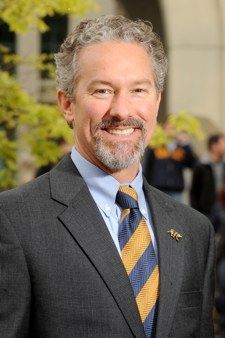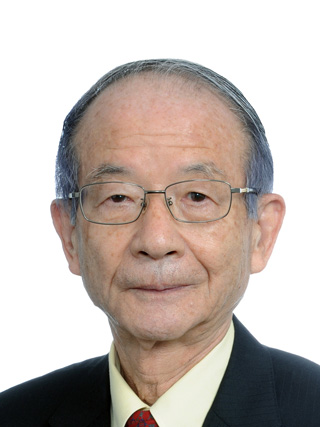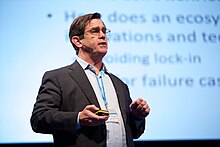
The University of California, Berkeley is a public land-grant research university in Berkeley, California. Founded in 1868 and named after Anglo-Irish philosopher George Berkeley, it is the state's first land-grant university and the founding campus of the University of California system. Berkeley is also a founding member of the Association of American Universities. It has been regarded as one of the top universities in the world.

Oliver Eaton Williamson was an American economist, a professor at the University of California, Berkeley, and recipient of the 2009 Nobel Memorial Prize in Economic Sciences, which he shared with Elinor Ostrom.
The Walter A. Haas School of Business is the business school of the University of California, Berkeley, a public research university in Berkeley, California. It was the first business school at a public university in the United States.
Open innovation is a term used to promote an information age mindset toward innovation that runs counter to the secrecy and silo mentality of traditional corporate research labs. The benefits and driving forces behind increased openness have been noted and discussed as far back as the 1960s, especially as it pertains to interfirm cooperation in R&D. Use of the term 'open innovation' in reference to the increasing embrace of external cooperation in a complex world has been promoted in particular by Henry Chesbrough, adjunct professor and faculty director of the Center for Open Innovation of the Haas School of Business at the University of California, and Maire Tecnimont Chair of Open Innovation at Luiss.

David John Teece is a New Zealand-born US-based organizational economist and the Professor in Global Business and director of the Tusher Center for the Management of Intellectual Capital at the Walter A. Haas School of Business at the University of California, Berkeley.
Mark Edward Rubinstein was a leading financial economist and financial engineer. He was Paul Stephens Professor of Applied Investment Analysis at the Haas School of Business of the University of California, Berkeley. He held various other professional offices, directing the American Finance Association, amongst others, and was editor of several first-tier academic journals including both the Journal of Financial Economics and the Journal of Finance. He was the author of numerous papers and four books.
John Zysman is a professor of Political Science at the University of California, Berkeley and co-founder of the Berkeley Roundtable on the International Economy (BRIE). Professor Zysman received his B.A at Harvard and his Ph.D. at MIT. He has written extensively on European and Japanese policy and corporate strategy; his interests also include comparative politics, Western European politics, political economy and energy policy.

Peter Gordon Klein is an American economist who studies managerial and organizational issues. Klein holds the W. W. Caruth Endowed Chair and is a professor of entrepreneurship at Baylor University's Hankamer School of Business, where he is also Chair of the Department of Entrepreneurship and Corporate Innovation. Klein is Academic Director of the Baugh Center for Entrepreneurship and Free Enterprise, adjunct professor of strategy and management at the Norwegian School of Economics, and Carl Menger Research Fellow at the Mises Institute. He serves as associated editor for Strategic Entrepreneurship Journal and associate editor of The Independent Review. His 2012 book Organizing Entrepreneurial Judgment won the 2014 Foundation for Economic Education Best Book Prize and has been translated into Polish and Persian. His 2010 book The Capitalist and the Entrepreneur has been translated into Chinese and Portuguese. He holds an honorary professorship at the Beijing University of Information Science and Technology.
The Arrow information paradox, and occasionally referred to as Arrow's disclosure paradox, named after Kenneth Arrow, American economist and joint winner of the Nobel Memorial Prize in Economics with John Hicks, is a problem faced by companies when managing intellectual property across their boundaries. It occurs when they seek external technologies for their business or external markets for their own technologies. It has implications for the value of technology and innovations as well as their development by more than one firm, and for the need for and limitations of patent protection.

Robert I. Sutton is a professor of management science at the Stanford University School of Engineering and a researcher in the field of evidence-based management. He is a New York Times best-selling author.

Richard Kent Lyons was the 14th Dean of the Haas School of Business, University of California, Berkeley, until 2018. In 2020 he became UC Berkeley's first Chief Innovation and Entrepreneurship Officer.

Ikujiro Nonaka is a Japanese organizational theorist and Professor Emeritus at the Graduate School of International Corporate Strategy of the Hitotsubashi University, best known for his study of knowledge management.
The InnovationXchange, also known as IXC UK, is a Lincoln, UK-based open innovation services and consulting provider, whose purpose is to identify and create collaborative business, research and policy opportunities.
Before being open, innovation happened in closed environments often performed by individuals, scientists or employees. However, the expression closed innovation was coined later and not before the paradigm of open innovation became popular by works of Henry Chesbrough and Don Tapscott et Anthony D. Williams
Mariann Jelinek is an American organizational theorist, and Emeritus Professor of Strategy at the College of William & Mary, considered an icon for her contributions in the field of management of technology and innovation.

Solomon Darwin is an American professor of business and the director of the Garwood Center for Corporate Innovation and the executive director of the Center for Growth Markets at the Haas School of Business at the University of California, Berkeley. He is known as the visionary leader of the Smart Village Movement and for developing "smart village frameworks" for rural villages with the support of state and local governments in India and UC Berkeley. He published four books to support his thesis : "How to Create Smart Villages: Open Innovation Solutions for Emerging Markets", "How to Think like the CEO of the Planet", "The Untouchables" and "Smart Villages of Tomorrow: The Road to Mori" and is known as the Father of the Smart Village Movement.
Sabine Brunswicker is a Full Professor for Digital Innovation at Purdue University, West Lafayette, United States, and the Founder and Director of Research Center for Open Digital Innovation (RCODI). She is a computational social scientist with a particular focus on open digital innovation who engages with an interdisciplinary group of researchers to predict individual and collective outcomes in open digital innovation. She has written numerous research papers and books chapters on Open Innovation, and is an internationally recognized authority in the field. She chaired the World Economic Forum workshop for a session titled "Open innovation as a driver of business and economic transformation" in 2014. She is known for pioneering Purdue IronHacks, an iterative hacking initiative (www.ironhacks.com) that encourages experiential learning at Purdue University.
Karthik Ramanna is Professor of Business & Public Policy and Director of the Master of Public Policy Program at the University of Oxford’s Blavatnik School of Government, where he established the leadership curriculum on building trust across divided communities.
Benjamin E. Hermalin is an American economist and university administrator. He holds professorships in the department of economics at the University of California, Berkeley and in Berkeley's Haas School of Business, where he is the Thomas & Alison Schneider Distinguished Professor of Finance. Since 2022, he has also been Berkeley's executive vice chancellor and provost.








